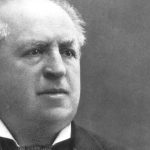
Leaders shape a vision that inspires a following. An inspired following effects change—hopefully, change that is positive and blesses others. But how does a major leader for good sustain their vision? Clarify it? Expand it? Deepen it? How do they avoid becoming larger than the vision? Preoccupied with self more than with the cause? Compromising their integrity? Disappointing and shattering their following?
The Christian landscape is littered with examples of leaders who began well but went rogue. This, by God’s grace, did not happen with Abraham Kuyper.
Why not?
You are holding the answer in your hands. He maintained a lifelong, intimate walk with the Lord—a walk reflected in his written meditations, a selection of which are published in Ever in Thy Sight.
Abraham Kuyper was born in 1837, the son of a Reformed pastor in the state church of the Netherlands. He distinguished himself as a brilliant student at the University of Leiden who was accorded high praise for his doctoral dissertation. Rejecting prospects for a stellar career as a university professor, he chose the life of a village pastor, confident in his modernist approach to the Bible. Many in his parish were unimpressed by his preaching, but he became increasingly impressed by the depth of their faith and by their exemplary lives. Wisely, he consulted a simple but highly respected Christian woman to learn about this life of faith. They struck up a deep friendship, and she introduced him to powerfully spiritual literature that nurtured her faith. Kuyper listened. Kuyper read. Kuyper reflected. He changed spiritually—you might even say that the pastor was converted by his parishioner. He began reading the Bible not merely with the eyes of scientific inquiry but of trustful dependence on the God revealed there. In short, Kuyper began a life of daily communion and walk with the Lord.
Through this life of newfound fellowship, Abraham Kuyper developed a sense of how majestic, powerful, and compassionate God is. He came to know God as Father and his Son, Jesus Christ, as his personal Lord and Savior. Kuyper responded in adoration and praise. His reason for living became to serve this God—in everything, completely, with total devotion.
What is truly amazing about the life of Abraham Kuyper is that he determinedly maintained his walk with his God until the very end of his life on earth. He achieved this by separating himself once a week, every Sunday, from his daily responsibilities in order to meditate on Scripture and to pray. Out of this weekly encounter with God he wrote a meditation, articulating what he saw and envisioned as he communed with his Maker that day. In writing the meditation, he was walking with God. With rare exceptions, Kuyper kept this weekly appointment with God. Beginning in the early 1870s, he wrote these weekly meditations until the week before he died in November 1920. They were published in his weekly religious paper; in all, Kuyper published more than 2,200 meditations there.
Kuyper’s devotions also inspired a following. They were models of daily walking with the Lord. They cast a vision of God and communion with him. They express triumphant faith while categorically rejecting human triumphalism. They appeal to Christians of all social standing, especially those like the woman whom the Spirit used to open the doorway to the Bible for Kuyper. Such people read him gladly, expectantly, every week.
Ultimately, Abraham Kuyper’s meditations on Scripture bring people into communion with God. They share his beatific vision of the God of grace for all who truly come to him.
This post is adapted from James A. De Jong’s introduction to Ever in Thy Sight: 31 Devotions on the Psalms by Abraham Kuyper (Lexham Press, 2020).





